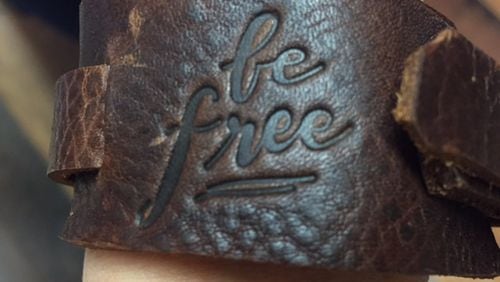Nicole is on the way to getting her happy back.
Forty hours a week, Nicole and several other women work at Marietta's Glory Haus workroom called "Repurposed on Purpose," where they make items for Jen Hatmaker's collection of leather bracelets and earrings.
Nicole, who didn’t want her full name used for safety reasons, fled an abusive relationship and was homeless for a while. She didn’t feel good about herself or her prospects in life.
She found hope, though, through MUST Ministries, which provided much-needed support. She now lives in transitional housing.
“There was a fear of having to go back to that situation or my children going back without protection,” said Nicole, as she worked in a room in the spacious Glory Haus office. “When you’re in a situation like that, you want to get out, but you’re not sure what the future holds.”
Her future is perhaps brighter than it has been in a while. She said the job has helped her build her confidence and stability.
The women are part of a partnership between MUST Ministries, a nonprofit that helps people who are in need and the homeless, and national faith-based Glory Haus that began several months ago to help women break out of homelessness. They earn above minimum wage and receive health care.
"The most important thing MUST offers people is hope," said Ike Reighard, president and CEO of MUST. "This creative workshop is a perfect fit because our mission is in line with Glory Haus and we are working together to provide hope to the hopeless. It's so meaningful to see these women use their talents, skills, enthusiasm and creativity to make beautiful items that bless others. In the meantime, they are becoming financially stable."
MUST serves about 30,000 people annually, 80 percent of whom are women and children. It provide services in seven counties.
“We were created to bring hope to other’s people lives whether through our products that give inspiration or by giving jobs to people who may need a helping hand up,” said Molly Holm, owner and chief creative officer of Glory Haus, which designs and makes inspirational gifts and home decor products.
Holm started the business in her home in 2008 with three friends. The women wanted to create products that offered joy and encouragement and to share their love of God. Today, products include wall art, picture frames, canvases, jewelry, mugs, pillows and collegiate products.
The partnership “is one of the most important things that I’m working on now,” said Hatmaker, a popular inspirational speaker, blogger and best-selling author of books such as “Interrupted: When Jesus Wrecks Your Comfortable Christianity.”
“When I first started talking to the Glory Haus team, I said I needed this to matter and to affect people’s lives in a positive economic way.”
When she realized how she could help, “my heart started singing. These women are my people. They’re my friends. They’re very creative, they’re very smart and they’re very brave.”
Their work has expanded. In addition to the Hatmaker products, the women also create jewelry made from recycled items, leather Christmas ornaments for MUST Ministries, gifts for a business in Tennessee and wrap bracelets for “Duck Dynasty” reality star Sadie Carroway Robertson’s collection.
Many of their items are sold online at Glory Haus ( www.gloryhaus.com ). They're also available at other retail outlets and on the new Glory Haus traveling pop-us bus.
The program has also helped Donna, who was out of work for seven years because of poor health. She lost her home and her car. She was homeless and now lives in supportive housing. The job is important because it will help her regain some of what she lost.
“It’s helped me financially, emotionally, spiritually,” she said. “Everything. Not being able to work, you lose hope. I’m thinking maybe one day I can get out of (supportive housing) and take care of myself.”






